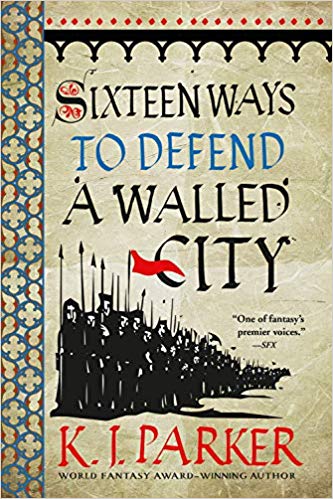 Sixteen Ways to Defend a Walled City by K.J. Parker
Sixteen Ways to Defend a Walled City by K.J. Parker Format: eARC
Source: supplied by publisher via NetGalley
Formats available: paperback, ebook
Genres: fantasy, military fantasy
Pages: 350
Published by Orbit on April 9, 2019
Purchasing Info: Author's Website, Publisher's Website, Amazon, Barnes & Noble, Kobo, Bookshop.org
Goodreads
This is the story of Orhan, son of Siyyah Doctus Felix Praeclarissimus, and his history of the Great Siege, written down so that the deeds and sufferings of great men may never be forgotten.
A siege is approaching, and the city has little time to prepare. The people have no food and no weapons, and the enemy has sworn to slaughter them all.
To save the city will take a miracle, but what it has is Orhan. A colonel of engineers, Orhan has far more experience with bridge-building than battles, is a cheat and a liar, and has a serious problem with authority. He is, in other words, perfect for the job.
My Review:
Usually it’s the plucky band of rapscallions who stage a breakout, and the plucky band of heroes who hold the defense. This time it’s the plucky rapscallions doing the defending! That’s the first, but far from the last, twist on pretty much everything you expect from this genre – and every other genre that it sends up, down or sideways during the course of the story.
At first, this reminded me in a very peculiar way of the Starfleet Corps of Engineers books. Like I said, it’s peculiar. But that series is quasi-military SF told from the perspective of the people who keep things running – and not the people who usually take those things into harm’s way.
Sixteen Ways to Defend a Walled City is more-or-less military fantasy told from that same perspective. Orhan is the Colonel of Engineers for the military of an empire that has subjugated not just his people, but pretty much every people around that is not themselves – and then keeps them down while looking for more people to conquer and subjugate.
The Robur Empire sounds a lot like the Roman Empire. I don’t just mean the two words are similar, I mean that the two empires are very similar. And use similar sounding names and offices and officers and procedures and well, it actually drove me a bit batty. It all sounds so much like Rome that I half expected something to explain the similarity – which otherwise makes no sense.
I don’t mean that the similarities of systems make no sense – Rome makes a great antecedence for how to and not to run an empire, I mean that the constant congruence of names for things and people and places made no sense. Although on my other hand, Orhan is the most unreliable of narrators it has ever been my media consuming pleasure to run across. And I’m including Varric Tethras in that tally of unreliability. Varric is more lovable, but he’s a shade more reliable. Or a shade less shady. Or both.
The story in Sixteen Ways to Defend a Walled City can be taken in multiple ways. Looking at it from one angle, it’s the story of an extremely unlikely hero who rises up and defends the besieged capital of an empire that treats him as a fourth-class citizen at best.
The problem for Orhan is that as an engineer, he can’t resist trying to solve this biggest of all problems. And that his friends are on the inside of the city. He’s not so much defending it as defending them – whether they appreciate it or not.
Another way of looking at the whole thing is from the perspective that the siege of the capital, and the dismantling of the empire that precedes it, is just all of the empire’s chickens, its nasty and terrible treatment of all of the many, many people it has subjugated, all coming home to roost in one giant pile of chickenshit.
With a bit of accelerant, manure burns really, really well. The empire has been providing plenty of impetus and accelerant for centuries – now it’s time to watch the explosion. Unless Orhan can manage to stop it from happening – one underhanded way or another.
Escape Rating B: This is a very mixed feelings kind of review. I loved the opening scenes of the story. The over-the-top snarkitude of the narrator was terrific and terrifically funny as well. It’s the sort of thing that makes a reader snerk and chortle every page.
Orhan has spent his career finagling the system in order to get the job done – but his internal dialog about exactly what he has to do, why he has to do it, and how easy it is to get it done because the system is so stupid, are good for a seemingly endless supply of wry chuckles.
But once the siege begins, Orhan, in spite of himself, becomes the authority – not because he wants to be but because he just can’t see that there’s any other way to survive. He’s dead certain – and more than occasionally nearly just plain dead, that anyone else would just get it wrong. Wrong-er. More wrong.
And while his many and varied attempts at getting all the city’s warring factions to work together make an interesting exercise in social engineering, they just aren’t as interesting as when Orhan and his crew were on their own. By himself, things going wrong until the last minute were funny. As the person in charge, it’s not funny at all.
The ending of the story, or rather Orhan’s end to the story, completely blew me away. But for this reader the middle went on too long. Your reading mileage may vary – no matter what units you use to measure it.















